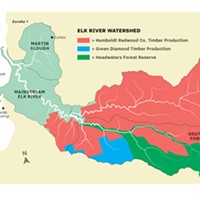Editor:
As Elaine Weinreb suggests in her article ("The Battle for Elk River," March 5) Maxxam's destruction of the watershed in the 1980s was not the first time this occurred. As far back as the 1870s, timber harvesters used the river to help transport their logs to mills on Humboldt Bay. In summertime, the loggers moved their cut timber into the nearly dry riverbed, creating small splash dams that held back the diminished water. When the fall rains hit, the rising river would knock out the dams and would carry the logs downstream to the mouth of Elk River. Hundreds of large redwood logs would bump and smash their way along the riverbed, gouging the channel and scraping off deep layers of sediment.
In 1880, Barton Glatt wrote the Humboldt Times to report on the effects of these logging practices. When he'd arrived in 1876, the banks of Elk River where it ran through his property were 16 feet high. Four years later the bank height was only 9 feet — the ravaged river had filled with 7 feet of sediment. Glatt contacted one of the precipitating timbermen, D. H. Jones, who assured Glatt that his logging operation had done no damage. H.H. Buhne chided Glatt, saying he "had no business to buy the place." Blaming the victim was alive and well in 1880.
The Wiyot Tribe called the river Iksori. They had several villages along it and would paddle their canoes upstream to Iksori's forks, whence they would travel by trail to the Kneeland area for summer hunting and gathering. The Wiyots had lived next to the river and canoed along it for centuries without creating any of the damage the whites wrought in less than three decades, but of course they had different priorities.
Jerry Rohde, Eureka
Editor:
Thanks for Elaine Weinreb's excellent update on Elk River's destruction. It's especially revealing along with J.A. Savage's history of Michael Milken, the junk bond criminal ("Milken's Unpardonable Redwood Felonies," March 5). We see it's a crime still in progress.
One story reminds us that the river belongs to the people. The other reveals a watershed controlled by a couple of bottom-feeding financiers in Houston and New York and two wealthy families in Seattle and San Francisco. How can that be?
Remember Robin Hood? Sherwood Forest was owned and governed in common. Taking more than your share was considered a crime. We see vestiges of that ancient law when we get a permit to cut firewood or gather mushrooms on public land. How did the forest get privatized?
The Shire Wood was taken over by royalty who thought the forest belonged to them. Like Charles Hurwitz. Or William Reed, chairman of Green Diamond's parent company. John Fisher, owner of Humboldt Redwood, the Oakland A's, etc. They are our Charles the Great, our Kings William and John. Duke Milken gets a royal pardon.
Of course, they have help. The Sheriff of Nottingham, the permitting agencies and officials, the Forest Stewardship Council, the token grants and reserves, all make it possible for money to overrule the people.
It can be done with handcuffs and pepper spray, but mostly it's accomplished by distorting facts and governing in a language we can't understand. In Robin's day it was Norman French. Nowadays it's Bio Latin, requiring a glossary and a new math. Do you know the TMDL for your 303(d)? Can you tell me when zero doesn't mean zero?
The log trucks are still busy on Elk River Road. The kings of capital still sucking the wealth from land and people. Degraded watersheds, degraded language, degraded leaders.
What would Robin Hood do?
Jerry Martien, Eureka
Editor:
NCJ's "The Battle for Elk River" points out that California "rivers ... are the legal property of the citizens of California, ... and state agencies are mandated ... to make sure that wildlife and waterways are not being damaged by inappropriate logging plans."
However, the Headwaters deal gave Pacific Lumber "assurances" that it and successor Humboldt Redwood Co. (HRC) could continue their short rotation harvesting. Green Diamond (GD) has water board permits to "accommodate important economic development."
Since 1987, unprecedented logging has wreaked havoc throughout the Elk River watersheds, denuding hillsides, filling waterways with sediment, killing fish and other wildlife, and flooding residents' access, egress and homes, damaging or destroying residents' drinking water sources, livelihoods and property, and creating dangerous conditions in the river.
In an untested experiment, the state now proposes to dredge 19 miles of river to remove 640,000 cubic yards of sediment, costing $64 million, plus the cost of raising six houses. The greenhouse gas emissions and riparian obliteration are unavoidable "collateral damage."
Whereas the taxpayer will foot this enormous bill, HRC and GD will continue their logging unscathed, assuring a constant re-supply of sediment and a dearth of large woody debris in the river.
The only proven remedy occurred during the 1997-1998 moratorium on logging imposed by the state agencies in Elk and Freshwater, when Elk's water quality began improving immediately. Robust studies of the watershed have proven that ongoing timber harvesting is incompatible with salmon, the free use and enjoyment of homes, liberty and the pursuit of happiness.
Consequently, Elk River residents have proposed a preferable, equitable and cheaper alternative: the forest lands in Elk River be purchased for a community forest to sequester carbon in long rotation harvests, which would naturally control sedimentation, recover the salmon fishery, protect riparian habitat, provide trails, and enhance tourism, recreation and our economy.
Jesse Noell, Elk River

Comments